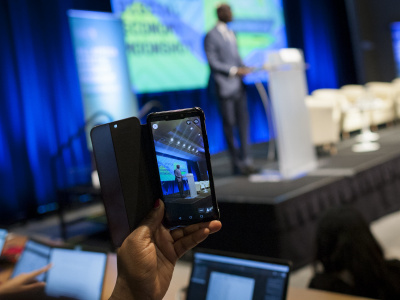
Digital diplomacy and the EU’s quest for digital geopolitical relevance
Authors
The EU hopes to strengthen its global role in digital affairs. This was apparent in the July 2022 Council Conclusions on digital diplomacy, where member states called for “a more visible, influential and coordinated Digital Diplomacy, making use of all relevant EU tools”. Yet, building a stronger European digital footprint will require the EU institutions to develop a coherent approach between internal and external digital policy, and member states to embrace a more comprehensive approach to digital in external action.
The EU institutions and member states will need to go beyond traditional foreign and development policy, investing in digital expertise, creating strong links with ministries focused on economic, trade, security and digital portfolios and building stronger links with the private sector.
A geopolitical EU?
The von der Leyen Commission has aimed from the beginning to be more ‘geopolitical’, driven both by the sense that the EU needs to work with like-minded allies to counter China’s outsize influence in Africa and elsewhere and by a growing sense that the EU needs to be more bullish about its economic interests given the current geopolitical context. These aims have only been reinforced by Russia’s use of disinformation and cyber warfare in its invasion of Ukraine.
The Global Gateway communication, published in December 2021, fits with the rhetoric of investing in a more political approach to the EU’s international partnerships. As we wrote recently, Global Gateway calls for a wholesale shift in how the EU approaches foreign and development policy, integrating a wide range of economic tools into the foreign and development policy toolbox. On the digital front, the EU hopes that by investing in safe, secure digital infrastructure across the world via Global Gateway, it can begin to build its digital footprint and impact how partner countries approach questions of digital governance.
At the same time, the EU institutions have been making efforts to build a more unified approach to digital policy in external action. On the defence front, a cyber diplomacy toolbox was developed in 2017, while more recently, the EU’s geopolitical aims regarding digital affairs were also integrated into the EU’s 2030 Digital Compass (March 2021), which lays out the EU’s digital ambitions through to 2030. The Council Conclusions on digital diplomacy laid out an ambitious agenda for the Commission and the EU’s foreign policy chief Josep Borrell.
To back its aims, the European Commission built a new digital team from scratch at the Directorate-General (DG) for international partnerships over the past two years, with the aim of taking a geopolitical approach to the EU’s international investments and cooperation policy in the digital arena. More recently, the European External Action Service (EEAS) created a new division on connectivity and digital transition.
Yet, domestic texts need to better integrate geopolitics, while elements of a truly geopolitical approach still remain to be fully elaborated. The external impact too often comes as an afterthought in recent EU texts and projects, such as with the Digital Services Act or Digital Markets Act. The EU also still lacks some of the tools necessary to take a truly geopolitical approach to digital in external action, notably when it comes to the rules on constraining which actors can apply for tenders via European development banks.
The Critical Minerals Act, mentioned in the recent State of the European Union (SOTEU) speech and later elaborated upon by Commissioner Breton aims to secure those minerals essential for the Green and Digital transitions, but it will need to be integrated into the EU’s green and digital diplomacy.
Some have argued about the need for a European digital diplomacy strategy, and this may certainly help, but more than this, there is simply the need for the European Commission leadership to follow through on the promise of coherence between the internal and external policy areas.
Member states’ role in building European influence
EU member states will also need to develop more coherent approaches to digital in external action that unite geopolitical, economic and development priorities into a united strategy. In the current geopolitical and economic context, EU member states need to be much more strategic in the way they approach digital in external action, adopting a cross-cutting approach to the digital dimensions of foreign, security, trade, investment and development policy.
In the Council Conclusions, member states invited the Commission and the EU foreign policy chief to “ensure complementarity and coherence between the EU’s and Member States’ internal and external digital policy initiatives and effective action.” Yet, such complementarity and coherence must start with the member states themselves, which should each ensure that all relevant domestic actors are speaking to each other.
Part of this will certainly entail continuing to do good development work, led first and foremost by the needs of those who have been most left behind by digital development. However, such an approach should be a complement to and not a replacement for a coordinated political and economic approach to digital policy in external action.
From D4D to digital geopolitics
In a positive step, twelve EU member states have already joined together to form the Digital for Development (D4D) Hub, adopting a true Team Europe approach, bringing together the EU institutions, member states, development banks and the private sector. This has led to cross-country discussions between the member states, and also with the European Commission, on digital cooperation and its place in digital geopolitics. This is a big step forward in terms of starting to build a coherent approach but could be replicated or expanded beyond the area of development.
The Council Conclusions also refer to strengthening the EU Digital Diplomacy Network, which would be another positive step, but the links and synergies between the two should also be explored. Ultimately, political, technological, security and economic diplomacy will need to be integrated to create a coherent approach. Of course, making the EU a strong digital actor on the global stage depends first and foremost on the EU’s own industrial policy, where investment in developing home-grown digital technologies will need to be ramped up. This seemed to be very much on the cards with a sovereignty fund proposed at the SOTEU speech.
Yet, alongside this, the EU and its member states will need to consistently defend and promote a common digital vision and interests on the world stage. Despite the much-vaunted success of the EU’s data protection law, GDPR, there are multiple steps necessary to make the EU a real actor in global digital affairs.
Recommendations to shape digital geopolitics
Internal-External coordination: External-facing policymakers should have the opportunity to truly weigh in on EU domestic priorities and their potential impact on the EU’s external action. It would also require investment in impact assessments to consider the potential external impact of certain legislation.
Investing in knowledge: The EU and member states need to invest in more expertise. This should include a growing investment in top-level staff focused on digital questions at foreign ministries and training for existing staff, particularly those working in partner countries. This also means investing in more people with foreign policy expertise in digital ministries and within domestic-facing DGs at the European Commission, ensuring that external impact is better integrated into domestic legislation.
Internal coordination: EU member states need to begin to ensure greater internal coherence, ensuring that digital ministries and foreign ministries are in sync, and are also integrating other relevant actors. They should also be connecting to their own private sectors about external opportunities.
Economic diplomacy: The Foreign Affairs Council and the EEAS could benefit from also bringing in a stronger focus on the economic dimension of digital diplomacy, including the cross-over with trade and investment policy, and learning to articulate more explicitly the EU’s own economic interests as part of its digital diplomacy.
Upping the ante of digital diplomacy: EU member state leaders and foreign ministers should begin to raise digital questions in their conversations with counterparts around the world, drawing on common positions. This should go hand in hand with an increased focus on trade and investment missions for Europe’s digital entrepreneurs.
Multilateral institutions: EU member states must have a joint approach to digital topics, including on extremely technical topics related to setting standards at institutions such as the International Telecommunication Union (ITU). Consistent efforts should be made to invest in developing allies, notably ahead of critical elections, such as that for Sec-Gen of the ITU later this month.
Internal expertise and coherence is an essential first step if the EU wants to play a role in shaping digital geopolitics, but this will of course be meaningless without solid external engagement.
The views are those of the author and not necessarily those of ECDPM.






